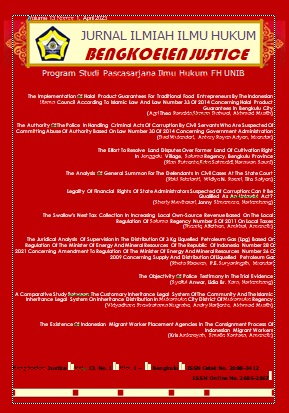Main Article Content
Abstract
To actualize the implementation of governance and development based on the principles of good governance dan clean good government, Law Number 30 of 2014 concerning government administration is the legal basis needed to base the decisions and/or actions of government officials to meet the legal needs of the public in governance. However, it is highly risky for corruption or abuse of authority possessed by government officials. The enactment of Law Number 30 of 2014 concerning Government Administration has changed the perspective of Law Number 20 of 2001 concerning the Eradication of Criminal Acts of Corruption, which has been carried out by the Police from an enforcement approach to an administrative approach by the Government Internal Supervisory Apparatus (henceforth APIP - Aparat Pengawas Internal Pemerintah). The addition of bureaucratic systems in eradicating criminal acts of corruption occurred due to the existence of this APIP. This research discusses the authority of police in handling criminal acts of corruption by civil servants (henceforth PNS – Pegawai Negeri Sipil) who are suspected of abuse of authority based on Law Number 30 of 2014 concerning government administration. The method used in this research was normative juridical law research with a statutory approach. The results of the research showed that police, in handling complaints or reports of the handling criminal acts of corruption by PNS who are suspected of committing acts of abuse of authority, must be submitted to the APIP first. The involvement of APIP makes the Police unable to act immediately and it is feared that this procedure will prolong the investigation process. Efforts are being made so that the handling of criminal acts of corruption can be effective in preventing state financial losses, namely by coordinating with APIP, the Financial and Development Supervisory Agency, (henceforth BPKP - Badan Pengawas Keungan dan Pembangunan -), and other external institutions.
Keywords: Police, Abuse of Authority, Criminal Acts of Corruption
Article Details
Copyright (c) 2023 Desi Wulandari, Antory Royan Adyan , Iskandar Iskandar

This work is licensed under a Creative Commons Attribution-ShareAlike 4.0 International License.

Ciptaan disebarluaskan di bawah Lisensi Creative Commons Atribusi-BerbagiSerupa 4.0 Internasional.
